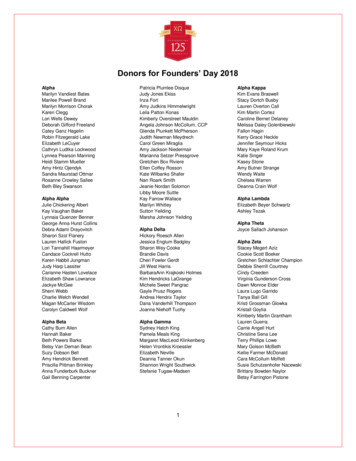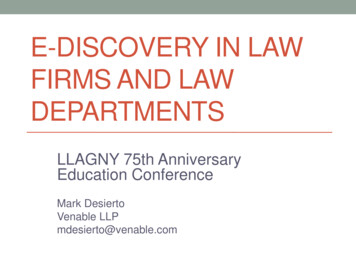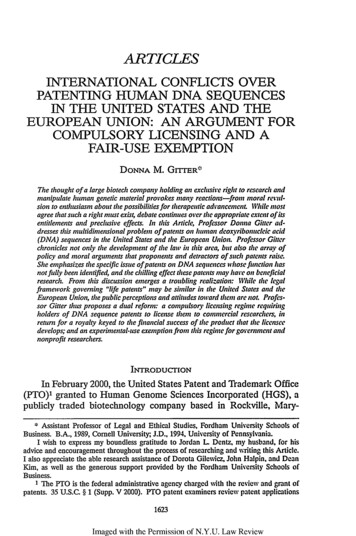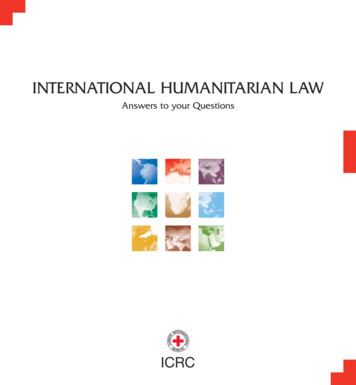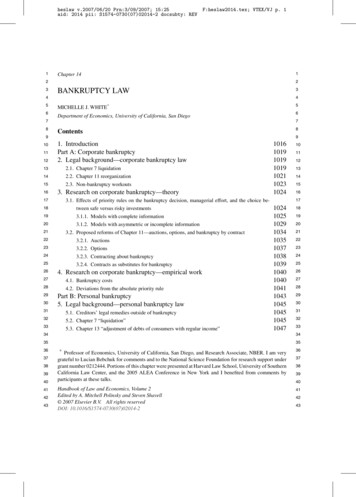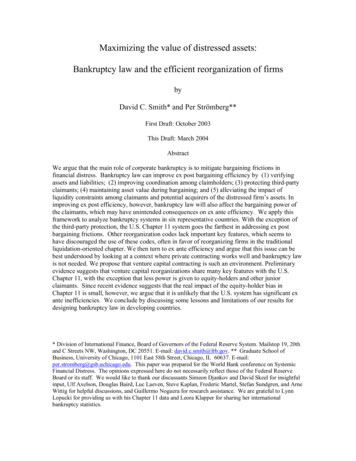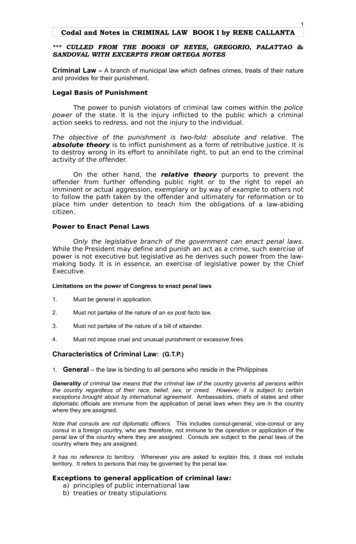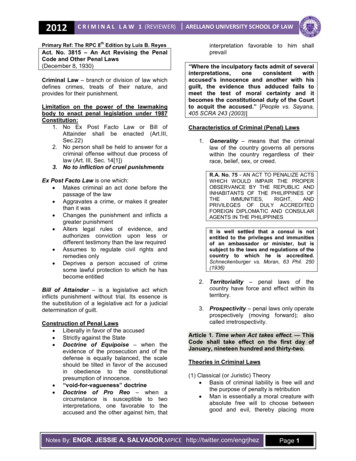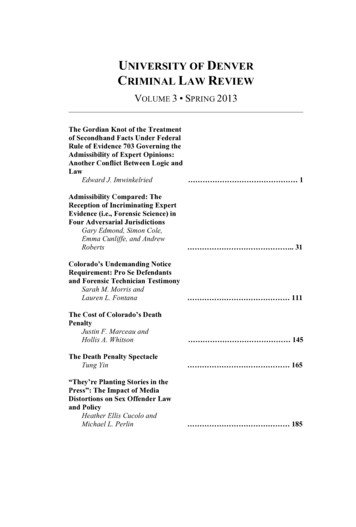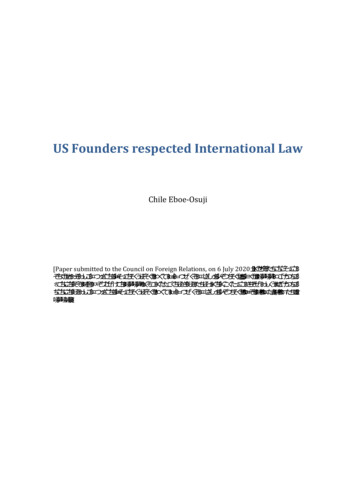
Transcription
US Founders respected International LawChile Eboe-Osuji[Paper submitted to the Council on Foreign Relations, on 6 July 2020; also presentedorally to the Rutgers International Law & Human Rights Journal's Fall 2020 LectureSeries on 16 November 2020, and appearing in print as adapted from that lectureseries in the Rutgers International Law & Human Rights Journal, Vol 1, Ep. 1, April2021]
Contents1. The US as the Principal Architect of the Modern International Order. 12. Was the ICC created by ‘Self-Styled “Global Governance” Advocates’? . 163. A ‘flawed’ International Legal System . 184. Is the ICC Truly the ‘Worst Nightmare’ of US Founders?. 215. Does the ICC Usurp National Sovereignty?. 346. Are US Citizens Immune from the Jurisdictions of Non-US Courts? . 347. The Alien Torts Claims Act . 448. Self Defence . 459. Is the ICC Judiciary a Mere Rubber Stamp for a Powerful Prosecutor? . 4610. Is the ICC Prosecutor ‘Unaccountable’?. 5011. Fair Trial Standards at the ICC . 51Conclusion . 54ii
US Founders respected International LawChile Eboe-Osuji*IT IS a just and not a new observation, that enemies to particular persons, and opponents toparticular measures, seldom confine their censures to such things only in either as are worthy ofblame. Unless on this principle, it is difficult to explain the motives of their conduct, who condemnthe proposed Constitution in the aggregate, and treat with severity some of the mostunexceptionable articles in it. – John Jay, ‘Federalist Paper No 64’, from The Independent Journal,Wednesday, March 5, 17881. The US as the Principal Architect of the Modern International OrderThe United Nations was the brainchild of a preeminent American statesman, PresidentFranklin D Roosevelt. But, he died just short of two weeks ahead of the globalconference of plenipotentiaries convened by him in San Francisco to negotiate andadopt the Charter of the proposed United Nations. It was then up to his Vice-PresidentHarry Truman to delay, postpone or cancel the Conference. Immediately upon hisswearing in as the next President in the evening of 12 April 1945, two and half hoursafter the death of his predecessor, President Truman’s very first decision in the WhiteHouse was to give the green light to the conference.1 And he gave the effort hismaximum support.Truman’s fervent support for the creation of the UN was not surprising. He was a trueadmirer of President Woodrow Wilson’s unsuccessful League of Nations efforts.2 It wastelling that Truman was known to carry in his wallet a copy of Alfred, Lord Tennyson’sLocksley Hall,3 the mini epic poem of 97 couplets that include the following 10:Yearning for the large excitement that the coming years would yield,Eager-hearted as a boy when first he leaves his father’s field,And at night along the dusky highway near and nearer drawn,Sees in heaven the light of London flaring like a dreary dawn;And his spirit leaps within him to be gone before him then,Underneath the light he looks at, in among the throngs of men:Men, my brothers, men the workers, ever reaping something new:That which they have done but earnest of the things that they shall do:For I dipt into the future, far as human eye could see,Saw the Vision of the world, and all the wonder that would be;Saw the heavens fill with commerce, argosies of magic sails,Pilots of the purple twilight dropping down with costly bales;Chile Eboe-Osuji, PhD, LLD (hc), President, International Criminal Court.See Stanley Meisler, United Nations – A History (1995, revised edition 2011), p 2.2 See Stephen C Schlesinger, Act of Creation – The Founding of the United Nations (2003), p 6.3 See Paul Kennedy, The Parliament of Man – The United Nations and the Quest for World Government(2006) at pp ix-x. See also Schlesinger, supra, p 5.*11
Heard the heavens fill with shouting, and there rain’d a ghastly dewFrom the nations’ airy navies grappling in the central blue;Far along the world-wide whisper of the south-wind rushing warm,With the standards of the peoples plunging thro’ the thunder-storm;Till the war-drum throbb’d no longer, and the battle-flags were furl’dIn the Parliament of man, the Federation of the world.There the common sense of most shall hold a fretful realm in awe,And the kindly earth shall slumber, lapt in universal law.In throwing his full weight behind the creation of the UN, President Truman had simplyseized an opportunity that fell onto his lap unsolicited, to realise that dream of‘build[ing] a new world – a far better world,’ as he was to put it in his address to thedelegates gathered in San Francisco on 25 April 1945 to negotiate and adopt the UNCharter.4 And when it was finally adopted, Truman brimmed with glee. ‘If we had hadthis Charter a few years ago – and above all, the will to use it,’ he enthused, ‘millionsnow dead would be alive. If we should falter in the future in our will to use it, millionsnow living will surely die.’5*Half a century later – in 1998 – another monumental multilateral treaty was adopted inRome, under the auspices of the UN. In adopting the Rome Statute to create theInternational Criminal Court, those who negotiated the text declared their mind-set inmemorable words that included the following:Mindful that during this century millions of children, women and men have been victims of unimaginableatrocities that deeply shock the conscience of humanityRecognizing that such grave crimes threaten the peace, security and well-being of the world.6Just as Truman had observed for the UN Charter 53 years earlier, it is not too strained aproposition to say this. Had the ICC been in existence immediately after the First WorldWar, when a tribunal like it was first broached in the Treaty of Versailles7 – as acountermeasure to the rampant impunity that was to come – ‘and above all [had therebeen] the will to use it’ – it might have been more difficult to murder six million humanbeings in a European genocide in the 1940s; 800 000 human beings in an Africangenocide that occurred in Rwanda in 1994; and more than 7 000 men and boysmassacred in Srebrenica in 1995 in an act of genocide. It might have been more difficultto commit the mass atrocities of a similar nature in Latin America during the frenzy ofthe Cold War era. Granted, the Rome Statute system would not have prevented all ofthese crimes – just as human beings have continued to commit murders, rapes andother crimes in national jurisdictions notwithstanding their much more robust judicialPresident Truman’s Address at the Opening Session of the United Nations Conference on InternationalOrganisation in San Francisco, 25 April 1945.5 President Truman’s Address at the Closing Session of the United Nations Conference on InternationalOrganisation in San Francisco, 26 June 1945.6 Rome Statute of the International Criminal Court, second and third paragraphs of the preamble.7 Treaty of Versailles, art 227.42
systems.8 Still, the prior existence of the ICC might have – at the barest minimum –confused the temerity of those who committed these historic atrocities on the scalesthat they did.*The linkage of the ICC’s creation to the global organisation that President Truman andPresident Roosevelt fathered is not hard to see. It is direct and immediate. As a matterof history, the following propositions are true: (1) the United Nations inseminated andfertilised the idea of the ICC, and midwifed its delivery; (2) the idea of the ICC resulteddirectly from the composite incidence of World War II and the Holocaust upon theconscience of world leaders in the immediate aftermath of that catastrophic epoch; and,(3) the idea of ‘utiliz[ing] the experience of Nürnberg in the development of thosepermanent procedures and institutions upon which the effective enforcement ofinternational law ultimately depends’ was a very American idea9 that caught on at theUN, culminating eventually in the creation of the ICC.In the outline, the story may begin with the events of 11 December 1946, during theresumed first session of the newly established UN. It was on that day that the GeneralAssembly adopted resolution 95(I) ‘affirm[ing] the principles of international lawrecognized by the Charter of the Nürnberg Tribunal and the judgment of the Tribunal’.In the same resolution, the General Assembly directed the ‘Committee on thecodification of international law’ – the predecessor to the body now known as theInternational Law Commission (ILC) – ‘to treat as a matter of primary importance plansfor the formulation, in the context of a general codification of offences against the peaceand security of mankind, or of an International Criminal Code, of the principlesrecognized in the Charter of the Nürnberg Tribunal and in the judgment of the Tribunal’.For present purposes, it is necessary to recall the important history of Resolution 95(I).It was an initiative of the United States,10 traceable to President Truman,11 tracked backto his response to Judge Francis Biddle (the US Judge on the Nuremberg Tribunal) whohad submitted a report to the President – at the President’s request – making preciselythe recommendations that were eventually reflected in General Assembly resolution95(I). It may be emphasised that Judge Biddle’s report is particularly revealing ofTruman’s own desire for a new world order according to international law and justice.We will study Judge Biddle’s report a little later. But, it may be more convenient, fornow, to consider the key messages of President Truman’s letter to Judge Biddleresponding to that report. President wrote as follows, amongst other things:For instance, according to the United Nations Surveys on Crime Trends and Operations of CriminalJustice Systems, in 2017, there were 660 murders in Canada; 803 in the UK; 813 in Germany; 824 inFrance, and 17,284 in the US.9 See Judge Francis Biddle, Report to President Truman, 9 November 1946, in United States, Departmentof State Bulletin, vol XV, No 386 of 24 November 1946, p 956.10 See Antonio Cassese, ‘Affirmation of the Principles of International Law recognized by the Charter ofthe Nürnberg Tribunal’ (2009). Available at https://legal.un.org/avl/pdf/ha/ga 95-I/ga 95-I e.pdf .See also ‘Affirmation of the Principles of International Law recognized by the Charter of the NürnbergTribunal’ https://legal.un.org/avl/pdf/ha/ga 95-I/ga 95-I ph e.pdf 11 See V V Pella, ‘Towards an International Criminal Court’ (1950) 44 American Journal of InternationalLaw 37, p 41, footnote 11.83
When the Nurnberg Tribunal was set up, all thoughtful persons realized that we were taking a step thatmarked a departure from the past. An undisputed gain coming out of Nurnberg is the formalrecognition that there are crimes against humanity I hope we have established for all time theproposition that aggressive war is criminal and will be so treated. That tendency [toward global peace]will be fostered if the nations can establish a code of international criminal law to deal with all who wageaggressive war. The setting up of such a code as that which you recommend is indeed an enormousundertaking, but it deserves to be studied and weighed by the best legal minds the world over. It is a fittingtask to be undertaken by the governments of the United Nations. I hope that the United Nations, in line withyour proposal, will reaffirm the principles of the Nurnberg Charter in the context of a general codification ofoffenses against the peace and security of mankind [the Nuremberg proceeding was] a judicialproceeding which has blazed a new trail in international jurisprudence and may change the course ofhistory.12In those observations, President Truman was largely echoing the sentiments that JudgeBiddle had expressed in his report. Biddle’s report was not spontaneous. When Biddle,on returning from Nuremberg, conferred with Truman, the two men could haveexchanged ideas and interesting musings – verbally – about a new world order and leftit at that. But, no. President Truman specifically asked Biddle to submit to him not only areport on the work of the Nuremberg Tribunal, but also to ‘make recommendations forfurther action.’13 Biddle obliged and submitted a report, including recommendations therelevant excerpts of which are set out in this footnote.14 Notably, Judge Biddle did morePresident Truman’s Letter to Francis Biddle in Response to His Report on the Nurnberg Tribunal, dated12 November 1946, in United States Office of the Federal Register, National Archives and Records Service,General Services Administration, Public Papers of the Presidents of the United States: Harry S Truman –Containing the Public Messages, Speeches and Statements of the President – January 1 to December 31, 1946[Washington: United States Government Printing Office, 1962] at pp 480-481, emphasis added. Alsoavailable at unal 13 See Francis Biddle, Report to President Truman, 9 November 1946, in United States, Department ofState Bulletin, vol XV, No 386, 24 November 1946, p 954.14 In his report, Biddle informs that Truman had ‘expressed abiding interest’ in the work of theNuremberg Tribunal, when he appointed Biddle as the American Member of the Tribunal. [Ibid.] On thatoccasion, Biddle recalled, Truman was ‘particularly anxious . that no disagreement should arise amongthe four great nations who on August 7, 1945, had signed the London Agreement and Charter providingfor the trial, formulating the law and establishing the practice, a disagreement which might prevent orobstruct this significant experiment in the field of international justice.’ [Ibid, p 955]. Biddle recalledTruman’s ‘hope that Nurnberg might serve as a working example for the world of how four nations couldachieve results in a specific field of endeavour.’ According to Biddle, Truman ‘recalled the failures intrying war criminals after the first World War, and [was] fully aware of the difficulties that would beencountered.’ [Ibid.] But, Biddle reported that ‘the unity of action’ that Truman hoped for among the fournations represented on the Nuremberg Tribunal was ‘well realized’. He reported, in that regard, that‘[t]he fundamental principles of international law enunciated by the Judgement of Nurnberg were statedunanimously in the opinion of the Tribunal by the four member nations, the United States, UnitedKingdom, Republic of France, and the USSR.’ [Ibid]. Biddle’s distillation of the principles of law thatemerged from Nuremberg are particularly instructive, even for present day purposes. As he put it, lookingpast the details of the Nuremberg experience in certain aspects, he continued as follows:‘of greater importance for a world that longs for peace is this: the [Nuremberg] Judgment hasformulated, judicially for the first time, the proposition that aggressive war is criminal, and will be sotreated. I do not mean that because of this interpretation men with lust for conquest will abandonwar simply because the theory of sovereign immunity cannot be invoked to protect them when theygamble and lose; or that men will ever be discouraged from enlisting in armies and fighting for theircountry, because military orders no longer can justify violations of established international law.Such a conclusion would be naive. But the Judgement of Nurnberg does add another factor to thosewhich tend towards peace. War is not outlawed by such pronouncements, but men learn a littlebetter to detest it when as here, its horrors are told day after day, and its aggressive savagery is thusbranded criminal. Aggressive war was once romantic; now it is criminal. For nations have come to124
than recommend the affirmation of the Nuremberg principles of international law and adraft code of international crimes: he also broached the idea of a permanentinternational institution to enforce those principles. He did so in the following words:In short, I suggest that the time has come to set about drafting a code of international criminal law. Isuggest that immediate consideration be given to drafting such a code, to be adopted, after the mostcareful study and consideration, by the governments of the United Nations.The Charter of the United Nations provides in Article 13 that “the General Assembly shall initiate studiesand make recommendations for the purpose of . encouraging the progressive development ofinternational law and its codification.” Pursuant to this article the United States has already taken theinitiative in placing upon the Agenda of the General Assembly meeting in New York the question ofappropriate action. The time is therefore opportune for advancing the proposal that the United Nations asa whole reaffirm the principles of the Nürnberg Charter in the context of a general codification of offencesagainst the peace and security of mankind. Such action would perpetuate the vital principle that war ofaggression is the supreme crime. It would, in addition, afford an opportunity to strengthen the sanctionsagainst lesser violations of international law and utilize the experience of Nürnberg in the development ofthose permanent procedures and institutions upon which the effective enforcement of international lawultimately depends. .15Shortly before the declarations in his response letter to Judge Biddle, President Trumanhad foreshadowed the value that the Nuremberg proceedings held for the world, inrealize that it means the death not only of individual human beings, but of whole nations, not onlywith defeat, but in the slow degradation of decay of civilized life that follows that defeat.‘The conclusions of Nurnberg may be ephemeral or may be significant. That depends on whetherwe now take the next step. It is not enough to set one great precedent that brands as criminalaggressive wars between nations. Clearer definition is needed. That this accepted law was notspelled out in legislation did not preclude its existence or prevent its application, as we pointed outin some detail in the judgment. But now that it has been so clearly recognized and largely accepted,the time has come to make its scope and incidence more precise. .‘In short, I suggest that the time has come to set about drafting a code of international criminallaw. To what extent aggressive war should be defined, further methods of waging war outlawed,penalties fixed, procedure established for the punishment of offenders I do not consider here. Muchthought would have to be given to such matters. But certain salutary principles have been set forthin the Charter, executed by four great powers, and adhered to, in accordance with Article 5 of theAgreement by 19 other governments of the United Nations. Aggressive war is made a crime—“planning, preparation, initiation or waging of a war of aggression.” The official position ofdefendants in their government is barred as a defense. And o
Jul 06, 2020 · [Paper submitted to the Council on Foreign Relations, on 6 July 2020; also presented orally to the Rutgers International Law & Human Rights Journal's Fall 2020 Lecture Series on 16 November 2020, and appearing in print as adapted from that lecture series in the Rutgers International

